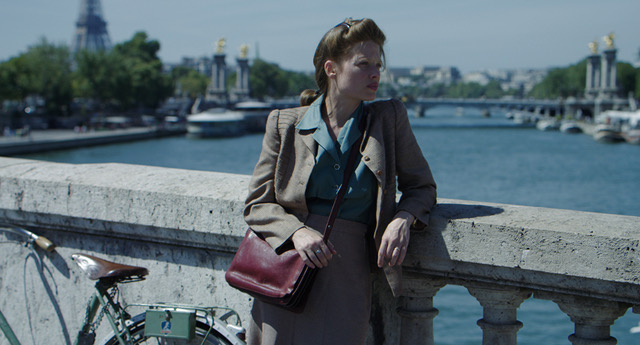Nazi occupied Paris, 1944-45. “Memoir of War,” written and directed by Emmanuel Finkiel and enhanced by the brilliance of his cast, brings to vivid life passages from Marguerite Duras’ diaries of life under the German occupation of Paris.
Countless films and plays have been written about those horrid years in Paris under the German boot, and I think I’ve seen them all.
But none to my memory has reached so deeply into the empty eyes and the darkness of the waiting souls.
It was a time when life was all about waiting, waiting for the liberation, for a knock on the door, for a phone call. Just waiting.
Names like Dachau, Auschwitz and Treblinka floated in the air, but they were only names that were whispered in smoky cafes, streets and alleys. Little was known of the true horrors.
On one of those streets, in a dark apartment on the fourth floor, writer Marguerite Duras (a brilliant Mélanie Thierry), an active member of the resistance, waited alone with her cigarettes and ersatz coffee, scratching words in her diary, as if those words alone would stop the pain.
She and her husband, Robert Antelme, had worked with the resistance for five years until he was betrayed by one of their own.
There would be days and weeks of plotting, following whispered gossip, sharing plans on how to bribe local informants to help. There were always great risks in this, for “trust” was a forgotten word. One such man, a Nazi collaborator (Benoît Magimel), befriends Marguerite and toys with her by promising to “see what he can do.”
But now at summer’s end, Marguerite’s spirit begins to fade.
She continues the daily walks to the rail stations to scan the faces of the forlorn, the defeated warriors coming home to Paris, hoping Robert will pop up in the sea of dirty brown uniforms.
Duras, a legendary novelist and activist, kept her diary throughout the war, even to the very last days, as she waited, smoking, constantly drinking, forgetting to eat. It was all she had to keep from slipping into insanity.
Then finally word comes about Robert, and that is the hardest part of the film to watch. Germany is preparing to surrender, thousands of prisoners are being executed, and he may be among them.
Robert is alive they say, but in serious condition. Word comes of his whereabouts, and his friends in the group concoct a daring plan to go to Germany to rescue him.
“Memoir” is no Hollywood action movie full of cloak-and-dagger melodramatics, with action provided by handsome and beautiful heroes.
This is a true story, narrated by Thierry as Duras in a voice that rises and fades as hope is dangled and then dashed.
Thierry speaks Duras’ lines from the diary, as the film moves through shadow and lights of her apartment, and as she bravely attends dangerous meetings in other parts of the city.
Duras’ words are painful, beautiful poetry, so realistically spoken that one can feel the pain in the writer’s fingers, as she sits with pencil in hand in the shadows of the day.
Toward the end, as the darkness and silence of her rooms seep into her mind, Duras hallucinates images of Robert in the shadows.
“Memoir of War” has not one easy moment of relief. Occasionally, it offers a soft hand of relief, but quickly pulls it away.
Director Finkiel’s camera faithfully follows actor Thierry’s steps, from street to cafe meetings to dark night solo wanderings through the streets like a faithful dog that stops when she does, and then moves on alongside her.
We walk here with Thierry, one of France’s most beloved and accomplished actors. In this tour de force, on screen constantly, she gives us a masterpiece of acting. Thierry as Duras drags us along with her, luring us into her cave of despair until, like her, we are on our knees.
Director Finkiel beautifully strengthens Duras’ words by giving us a Paris in cold winter light, stripped of the famed Parisian icons of joy. This is his City of Light gone dark.
There are only the bare streets full of hopelessness, with silent throngs of wandering faces, young and old, like Duras’, waiting, just waiting.
J.P. Devine, of Waterville, is a former stage and film actor.
Send questions/comments to the editors.



Comments are no longer available on this story